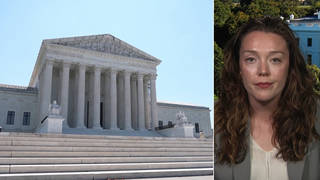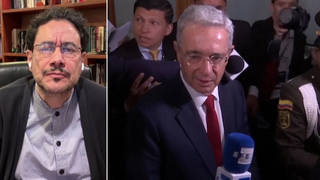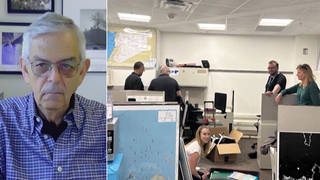
Guests
- Marco Simonsgeneral counsel for EarthRights International, which was part of a legal team representing Colombian plaintiffs in their landmark case against Chiquita.
In a landmark case in Florida, a federal jury has ordered Chiquita Brands International to pay over $38 million in damages to the families of eight Colombian men who were killed by paramilitaries the banana giant funded. Chiquita previously pleaded guilty to paying the far-right United Self-Defense Forces of Colombia paramilitary group, or AUC, $1.7 million from 2001 to 2004. Though Chiquita argued the payments were meant to protect company employees, the AUC has been found responsible for committing mass human rights abuses and murdering civilians from 1997 to 2006. “Chiquita essentially had a partnership with the paramilitaries,” says Marco Simons, general counsel for EarthRights International. “They voluntarily paid these groups in order to protect Chiquita against left-wing guerrillas and essentially to pacify the operating environment in the banana-growing region of Colombia.” Chiquita is one of the world’s largest banana producers and says it plans to appeal the jury’s verdict. The company is due to face a second so-called bellwether trial starting July 15. “For the past 17 years, we have been trying to get justice,” says Simons. “This is only the start of the judicial reckoning for Chiquita.”
Transcript
AMY GOODMAN: This is Democracy Now!, democracynow.org, The War and Peace Report. I’m Amy Goodman, with Juan González.
We end today’s show with a landmark ruling in a case that sought to hold a major U.S. corporation liable for its links to human rights abuses in another country. On Monday, in Florida, a federal jury ordered Chiquita Brands International to pay over $38 million in damages to the families of eight Colombian men who were killed by paramilitaries that Chiquita funded. The banana giant previously pleaded guilty to paying the far-right United Self-Defense Forces of Colombia paramilitary group, known as the AUC, $1.7 million from 2001 to 2004, which Chiquita argued it did to protect its workers. The AUC has been found responsible for committing mass human rights abuses and murdering civilians from 1997 to 2006. Federal prosecutors argued Chiquita’s support for the AUC was, quote, “prolonged, steady, and substantial.” This is Raquel Sena, widow of one of the killed farmworkers, responding to the jury’s decision.
RAQUEL SENA: [translated] I’m never going to overcome his death. … We want Chiquita Brands to acknowledge us, because they’re the ones who paid for people to get killed here.
AMY GOODMAN: Meanwhile, Colombian President Gustavo Petro responded to the ruling with a post on X, asking, quote, “Why could US justice determine in judicial truth that Chiquita Brands financed paramilitarism in Urabá? Why couldn’t Colombian justice?” Chiquita is one of the world’s largest banana producers and says it plans to appeal the jury’s verdict.
For more, we’re joined by Marco Simons, general counsel for EarthRights International, part of the legal team that represented plaintiffs in this case against Chiquita. He’s joining us from Washington, D.C., where he’s just returned from Florida.
Welcome to Democracy Now! Marco, if you can start off by talking about exactly what the jury ruled, who these families were, and the larger political picture of Chiquita? Ultimately, it’s not only about Chiquita in Colombia — Chiquita, which earlier was United Fruit — but throughout Latin America and Central America, in particular.
MARCO SIMONS: Yeah, thank you for that.
So, the jury in this case ruled that Chiquita was responsible for financing the AUC paramilitary death squads over a period of at least seven years, found that Chiquita was unreasonable, in the legal sense of that, in doing so, and that this funding contributed to the deaths of the plaintiffs’ family members at issue here. And importantly, the jury also specifically rejected Chiquita’s defense that they had put up, which was that they were extorted and under duress, that, essentially, they were making these payments in order to save lives. The jury ruled that Chiquita did not meet any of the requirements for the duress defense. They found that Chiquita was not under an imminent threat, that Chiquita essentially voluntarily put itself in position where they would have to make these payments, and that they found that Chiquita had other options other than to make these payments. So, even if you believe, you know, Chiquita’s argument that they were essentially forced to make these payments, they were not — that’s not a legal excuse for their responsibility here. Now, we don’t believe that that was the case. We believe the evidence that was put in front of the jury showed that Chiquita essentially had a partnership with the paramilitaries, that they voluntarily paid these groups in order to protect Chiquita against left-wing guerrillas and essentially to pacify the operating environment in the banana-growing region of Colombia.
Now, it’s important to note that these eight deaths represent only the start of Chiquita’s potential liability for its conduct, not the end of it. These deaths represent less than 1% of the claims for killings that have been filed against Chiquita in U.S. courts. There are thousands of claims that have been filed. And so, if you do the math from the verdict here, Chiquita’s potential exposure in potential future trials for more victims is well into the billions of dollars. So, we think this is a tremendous victory. We’re incredibly gratified for the jury’s verdict and for their service here over six weeks of trial with more than 60 witnesses and thousands of pages of evidence. But this is only the start of the judicial reckoning for Chiquita. I would also say that —
AMY GOODMAN: And —
MARCO SIMONS: Yeah, go ahead.
JUAN GONZÁLEZ: I’m sorry, Marco. I wanted to ask you if you could talk about the original or the prior 2007 Chiquita Brand guilty plea to criminal charges that basically paved the way for this case.
MARCO SIMONS: Yeah. So, in 2007, Chiquita pled guilty to a federal felony for essentially making financial transactions with a terrorist organization, which was the AUC paramilitaries, which was prohibited under U.S. federal law. And so they paid a $25 million fine at that point, but none of that money went to the victims of their conduct.
Later that year, we filed suit. And for the past 17 years, we have been trying to get justice, together with, you know, half a dozen different law firms who are also representing clients against Chiquita. And so, this is the first step toward actually seeing that justice come to fruition.
The federal prosecution of Chiquita was an important step in this process, but it’s not necessarily the basis for these claims. The basis for the claims is Chiquita’s conduct over more than seven years during the Colombian armed conflict. So, it is an important part of the picture. Chiquita is essentially a convicted felon, and they did admit — in the guilty plea, they admitted the essential elements of their conduct, that has led to their liability here. But there’s been a lot of litigation that’s happened in the 17 years since then that has brought us to this point.
JUAN GONZÁLEZ: And could you talk about the history of Chiquita? Obviously, the former United Fruit Company, perhaps the first major American multinational in Latin America, but has an infamous history of scandal and intrigue throughout the region.
MARCO SIMONS: Yeah. So, you know, we don’t — I’m sure we don’t have time to go into the complete history of the United Fruit Company in Latin America, but suffice to say that they are probably the company that, for the better part of the 20th century, was most associated with American imperialism in Latin America. And in fact, one of Chiquita’s own documents — when they were considering buying farms in Colombia back in the late 1980s, one of their own documents says that every Colombian schoolchild was essentially taught that Chiquita was associated with Yankee imperialism and is the prime example of that in Colombia.
And so, one of the things that I think is remarkable here is that these Colombian families, most of them essentially living at the margins of economic life in Colombia — these are farmworkers from rural Colombia — through the American justice system, they were able to essentially stand on equal footing with this major multinational corporation, which has been one of the most influential companies in Latin America for many, many decades, and prevail over them in this court process. There are also judicial processes ongoing in Colombia. There is a many yearslong transitional justice process and reckoning of the role of corporations and other actors in fueling the armed conflict in Colombia. But, you know, one of the things that the American justice system, when it works, is particularly good at is in holding corporations accountable for their contributions to extreme injuries. And we believe this is the first time that an American jury has held a corporation responsible for its contribution to serious human rights abuses outside the United States. And so it’s a significant step in that regard. It’s not the first time that corporations have paid remedies in such lawsuits. It’s just that most corporations have chosen to settle these suits before going to trial. And I think this jury verdict shows that those corporations are wise to do so, because the jury thoroughly rejected Chiquita’s defenses in this case.
AMY GOODMAN: I feel like I’m talking to two experts here: Marco Simons, who’s with EarthRights, deeply involved with this case that was just brought in Florida, and Juan, Juan González, co-host of Democracy Now!, author of Harvest of Empire: A History of Latinos in America, you know, talking about this history. Chiquita’s predecessor, United Fruit, responsible for the overthrow of Jacobo Árbenz, the democratically elected president of Guatemala, in 1954, and then, you know, it becomes Chiquita. And this is a bipartisan affair in the United States. And I want to go back in time. In November 2008, we interviewed the Colombian American journalist Mario Murillo and discussed Eric Holder’s relationship as Chiquita’s defense lawyer. At the time, Holder was being talked about — of course, he ultimately would be — President-elect Barack Obama’s pick for attorney general. This is Mario.
MARIO MURILLO: Eric Holder, who is currently defending Chiquita Brands International in its defense against dozens of plaintiffs here in Colombia, working families who were targeted by paramilitaries who were funded to the tune of $1.7 million over the last several years. It’s a major scandal. And if this guy becomes the attorney general under an Obama administration, then it’s going to be really hard to find justice in this case coming from the United States.
AMY GOODMAN: And I’m looking at an article in The Guardian from 2008. The headline was “Obama’s banana problem.” Marco Simons, if you can talk about this defense of Chiquita, that went way back, and the calculation they made, if occasionally they had to pay millions of dollars, that that was a price they would pay for continuing their work in Central America, the money they made much greater? But then if you can talk about the price that, for example, the people of Colombia paid?
MARCO SIMONS: Sure. But first let me say it’s correct that Eric Holder originally led Chiquita’s defense in this case, as well as their negotiations with the Department of Justice over their guilty plea. However, we don’t have any reason to believe that that affected the course of the litigation once he became attorney general. You know, it’s interesting to pair this story with the one about Hunter Biden, because I think both of them show that when the justice system in the United States works, it can work impartially.
So, you know, this case, I think the — what this case essentially shows is that the jury verdict here is a signal to corporate America that it can’t treat the lives of people in the countries where they work as the cost of doing business in those countries. And that’s what Chiquita did here. They essentially treated their payments, which fueled the armed conflict in Colombia, as simply the cost of doing business, similar to any other cost that they were trying to manage in producing bananas at the lowest price possible. And that led to the deaths of thousands of people, including the plaintiffs here. And unfortunately, the money that’s been ordered in this case will never bring back those lives. We’re still talking about horrific abuses here, and there’s nothing that can be done to fix that, ultimately. But the money is important, because that’s the language that corporations speak. And so, if they are making calculations of the cost of doing business, they need to factor in the cost of being held liable for their actions. And if Chiquita did treat this as the cost of doing business, they did not evaluate those costs very well, because now they’re facing potential exposure in the billions of dollars for their choices in Colombia. And so, we hope that if anything good comes out of this, it is that other corporations, as well as Chiquita itself, in the future will not make the same choices to treat the lives of the people in the countries where they operate as the cost of doing business.
JUAN GONZÁLEZ: And, Marco, I’m wondering, for those of our viewers and listeners who are not familiar with the recent history of Colombia, if you could talk about who were the United Self-Defense Forces that Chiquita was paying for, and also why they were not prosecuted in Colombia itself. There are ties to several presidential — several presidents of Colombia in subsequent years?
MARCO SIMONS: Yeah. So, the United Self-Defense Forces, known as the AUC, were a brutal paramilitary group that operated between about 1997 and 2006 in Colombia. So, if you have any conception of death squads in Colombia, these are the folks you’re thinking about. Now, Colombia has been in a protracted civil conflict for many decades, involving left-wing guerrilla groups that had been seeking to overthrow the Colombian government, most of which have now demobilized and turned in their weapons. However, during the bloodiest period of this civil conflict, the AUC paramilitary group rose up to fight against the guerrillas using, essentially, tactics that were even more brutal than the guerrillas’.
And Chiquita knew this. They don’t deny that they knew this. They, in fact, fully embraced this, because they say that’s why they were so scared of the AUC that they had to make these payments. So they fully knew of the AUC’s brutality, its responsibility for massacres, the horrific ways in which it would murder people.
And it was not limited to targeting guerrillas. The AUC targeted essentially anyone that it viewed as sympathetic to the left wing, whether those were trade unionists, politicians, anyone they viewed as sympathetic to the guerrillas, and, in fact, anybody who disrupted the social order. The AUC was well known for its social cleansing operations, as well. And some of the victims in these cases were also simply killed due to mistaken identity or due to conflicts with people in the AUC, who essentially operated with impunity for years in the Colombian countryside.
So, this was the worst period of the Colombian civil conflict, when the AUC decided that it needed to fight against the guerrillas, essentially protect the corporate and land-owning interests in Colombia by using tactics that were even more brutal than the guerrillas’ tactics. And the AUC got its start in some parts of the country, especially the banana-growing region, through the financing of banana growers and cattle ranchers. So, this was an organization that was essentially created in order to defend those agricultural interests. And while Chiquita claims that it itself was threatened by the AUC, they also admitted that, essentially, none of these payments were the result of threats by the AUC and that they were not aware of any cases where the AUC targeted American companies for violence. That was not the people that the AUC were targeting.
AMY GOODMAN: During the trial, Marco Simons, you were lead counsel and presented a handwritten memo from 2000 written by Chiquita’s in-house counsel, Robert Thomas. The memo lays out how the AUC set up legal fronts to receive payments, and argues the payments are necessary because the company, quote, “can’t get the same level of support from the military.” The memo, part of the National Security Archives’ Chiquita Papers and was obtained through FOIA requests. We only have 30 seconds. But the significance of this and why John Doe — the victims aren’t named — and how they’ll get the money?
MARCO SIMONS: Sure. So, just to clarify, I wasn’t lead counsel. This was a team effort, and our lead presentation was by Florida trial attorney Jack Scarola. But this was — you know, look, the evidence in this case was very clear that Chiquita was making these payments voluntarily because they believed they were getting protection from the AUC against the guerrillas. And they just didn’t care about the human cost of the protection money that they were paying.
AMY GOODMAN: Well, we’re going to leave it there, and I thank you so much for being with us, Marco Simons, general counsel for EarthRights International, the nonprofit, part of the legal team that represented the plaintiffs in the historic case against Chiquita. That does it for our show. To see our past coverage, over decades, of Chiquita, you can go to democracynow.org.
Democracy Now! produced with Mike Burke, Renée Feltz, Deena Guzder, Sharif Abdel Kouddous, Messiah Rhodes, Nermeen Shaikh, María Taracena. I’m Amy Goodman, with Juan González, for another edition of Democracy Now!












Media Options